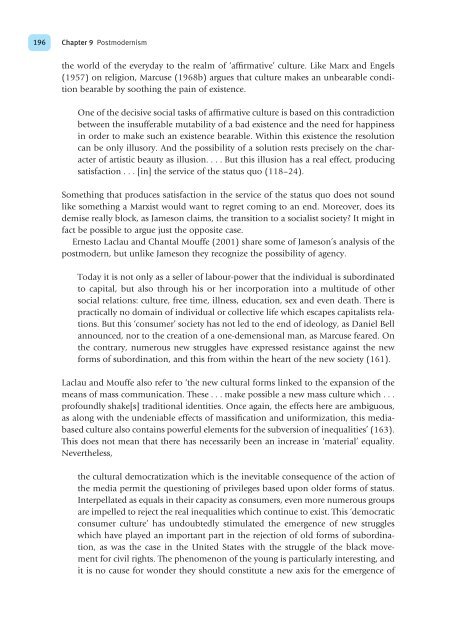Cultural Theory and Popular Culture
Cultural Theory and Popular Culture
Cultural Theory and Popular Culture
Create successful ePaper yourself
Turn your PDF publications into a flip-book with our unique Google optimized e-Paper software.
196<br />
Chapter 9 Postmodernism<br />
the world of the everyday to the realm of ‘affirmative’ culture. Like Marx <strong>and</strong> Engels<br />
(1957) on religion, Marcuse (1968b) argues that culture makes an unbearable condition<br />
bearable by soothing the pain of existence.<br />
One of the decisive social tasks of affirmative culture is based on this contradiction<br />
between the insufferable mutability of a bad existence <strong>and</strong> the need for happiness<br />
in order to make such an existence bearable. Within this existence the resolution<br />
can be only illusory. And the possibility of a solution rests precisely on the character<br />
of artistic beauty as illusion. . . . But this illusion has a real effect, producing<br />
satisfaction . . . [in] the service of the status quo (118–24).<br />
Something that produces satisfaction in the service of the status quo does not sound<br />
like something a Marxist would want to regret coming to an end. Moreover, does its<br />
demise really block, as Jameson claims, the transition to a socialist society? It might in<br />
fact be possible to argue just the opposite case.<br />
Ernesto Laclau <strong>and</strong> Chantal Mouffe (2001) share some of Jameson’s analysis of the<br />
postmodern, but unlike Jameson they recognize the possibility of agency.<br />
Today it is not only as a seller of labour-power that the individual is subordinated<br />
to capital, but also through his or her incorporation into a multitude of other<br />
social relations: culture, free time, illness, education, sex <strong>and</strong> even death. There is<br />
practically no domain of individual or collective life which escapes capitalists relations.<br />
But this ‘consumer’ society has not led to the end of ideology, as Daniel Bell<br />
announced, nor to the creation of a one-demensional man, as Marcuse feared. On<br />
the contrary, numerous new struggles have expressed resistance against the new<br />
forms of subordination, <strong>and</strong> this from within the heart of the new society (161).<br />
Laclau <strong>and</strong> Mouffe also refer to ‘the new cultural forms linked to the expansion of the<br />
means of mass communication. These . . . make possible a new mass culture which . . .<br />
profoundly shake[s] traditional identities. Once again, the effects here are ambiguous,<br />
as along with the undeniable effects of massification <strong>and</strong> uniformization, this mediabased<br />
culture also contains powerful elements for the subversion of inequalities’ (163).<br />
This does not mean that there has necessarily been an increase in ‘material’ equality.<br />
Nevertheless,<br />
the cultural democratization which is the inevitable consequence of the action of<br />
the media permit the questioning of privileges based upon older forms of status.<br />
Interpellated as equals in their capacity as consumers, even more numerous groups<br />
are impelled to reject the real inequalities which continue to exist. This ‘democratic<br />
consumer culture’ has undoubtedly stimulated the emergence of new struggles<br />
which have played an important part in the rejection of old forms of subordination,<br />
as was the case in the United States with the struggle of the black movement<br />
for civil rights. The phenomenon of the young is particularly interesting, <strong>and</strong><br />
it is no cause for wonder they should constitute a new axis for the emergence of
















